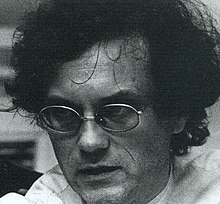Pierre-Félix Guattari (French: [ɡwataʁi] ![]() (listen) (help·info), "feh-LEEX GWA-tah-rhee"; March 30, 1930 – August 29, 1992) was a French psychiatrist, philosopher, semiologist, and activist. He founded two fields called schizoanalysis and ecosophy, and is best known for his academic partnership with Gilles Deleuze, especially their two-part book Capitalism and Schizophrenia. The first part of this is titled Anti-Oedipus and was published in 1972, and the second part is A Thousand Plateaus, published in 1980.
(listen) (help·info), "feh-LEEX GWA-tah-rhee"; March 30, 1930 – August 29, 1992) was a French psychiatrist, philosopher, semiologist, and activist. He founded two fields called schizoanalysis and ecosophy, and is best known for his academic partnership with Gilles Deleuze, especially their two-part book Capitalism and Schizophrenia. The first part of this is titled Anti-Oedipus and was published in 1972, and the second part is A Thousand Plateaus, published in 1980.

Life
changeGuattari was born in a suburb outside of Paris called Villeneuve-les-Sablons in 1930. He learned to practice a kind of psychology called psychoanalysis with his teacher Jacques Lacan in the early 1950s. He later worked at a psychiatric clinic called La Borde, which was his employer for the rest of his life.
Guattari contributed to a communist newspaper in Paris called La Voie Communiste (The Communist Way) from 1955 to 1965.[1] He was politically active in France throughout the 1960s, and he met his academic partner Gilles Deleuze through his political work. Together, they published the two-part work Capitalism and Schizophrenia in 1972 and 1980. They also wrote many other works, including What is Philosophy? (1991).
Guattari died at La Borde of a heart attack on 29 August 1992, aged 62.[2] His partner Gilles Deleuze died three years later.
References
change- ↑ Félix Guattari (1989) Schizoanalytic Cartographies. Paris: Editions Galilée p. x.
- ↑ "Felix Guattari, a Psychoanalyst And Philospher, Is Dead at 62" by Alan Riding, The New York Times, 3 September 1992